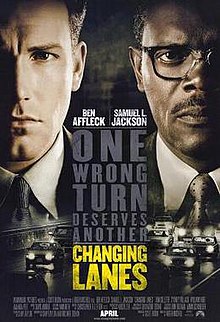Changing Lanes
| Changing Lanes | |
|---|---|

Theatrical release poster
|
|
| Directed by | Roger Michell |
| Produced by |
Scott Rudin Scott Aversano |
| Written by | Chap Taylor Michael Tolkin |
| Starring | |
| Music by | David Arnold |
| Cinematography | Salvatore Totino |
| Edited by | Christopher Tellefsen |
| Distributed by | Paramount Pictures |
|
Release date
|
|
|
Running time
|
99 minutes |
| Country | United States |
| Language | English |
| Budget | $45 million |
| Box office | $94,935,764 |
Changing Lanes is a 2002 American drama-thriller film directed by Roger Michell, and stars Ben Affleck and Samuel L. Jackson. The film follows a successful, young Wall Street lawyer (Affleck) who accidentally crashes his car into a vehicle driven by a middle-aged, recovering alcoholic insurance salesman (Jackson). After the lawyer leaves the scene of the accident, the two men try to get back at each other, engaging in a variety of immoral and illegal actions that end up having a major impact on each man's life. The film was released on April 12, 2002 in North America by Paramount Pictures. The film was favourably reviewed by critics and it was a box office success, earning almost $95 million against a $45 million budget.
Writers Chap Taylor and Michael Tolkin were nominated for the WAFCA Award for Best Original Screenplay for their work.
In New York City, a middle-aged African-American insurance salesman named Doyle Gipson is a recovering alcoholic who is attending Alcoholics Anonymous meetings to stay sober. On the same morning that Gipson drives to a hearing to try to regain custody of his children, a successful, white, young Wall Street attorney, Gavin Banek, is distracted while driving and collides with Gipson's car. Banek was in a rush to get to court to file a power of appointment document, which will prove a dead man signed his foundation over to Banek's law firm. Gipson was also in a rush to get to a hearing to prevent his estranged wife from taking his two boys to Oregon. Banek tries to brush Gipson off with a blank check, rather than exchanging insurance information, thereby disobeying the law. After Gipson refuses to accept the check and voices his desire to "do the right thing", that is, filing a police report and insurance claim, Banek strands Gipson on a median, telling him, "better luck next time". After arriving to the court late, Gipson learns that the judge ruled against him in his absence, never knowing that Gipson was about to buy a house for his wife and children.
...
Wikipedia
